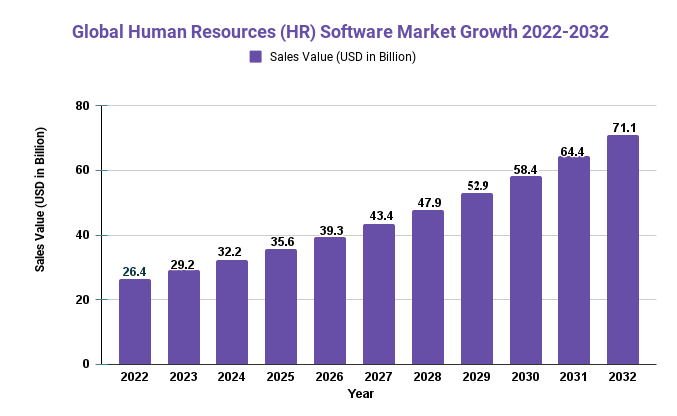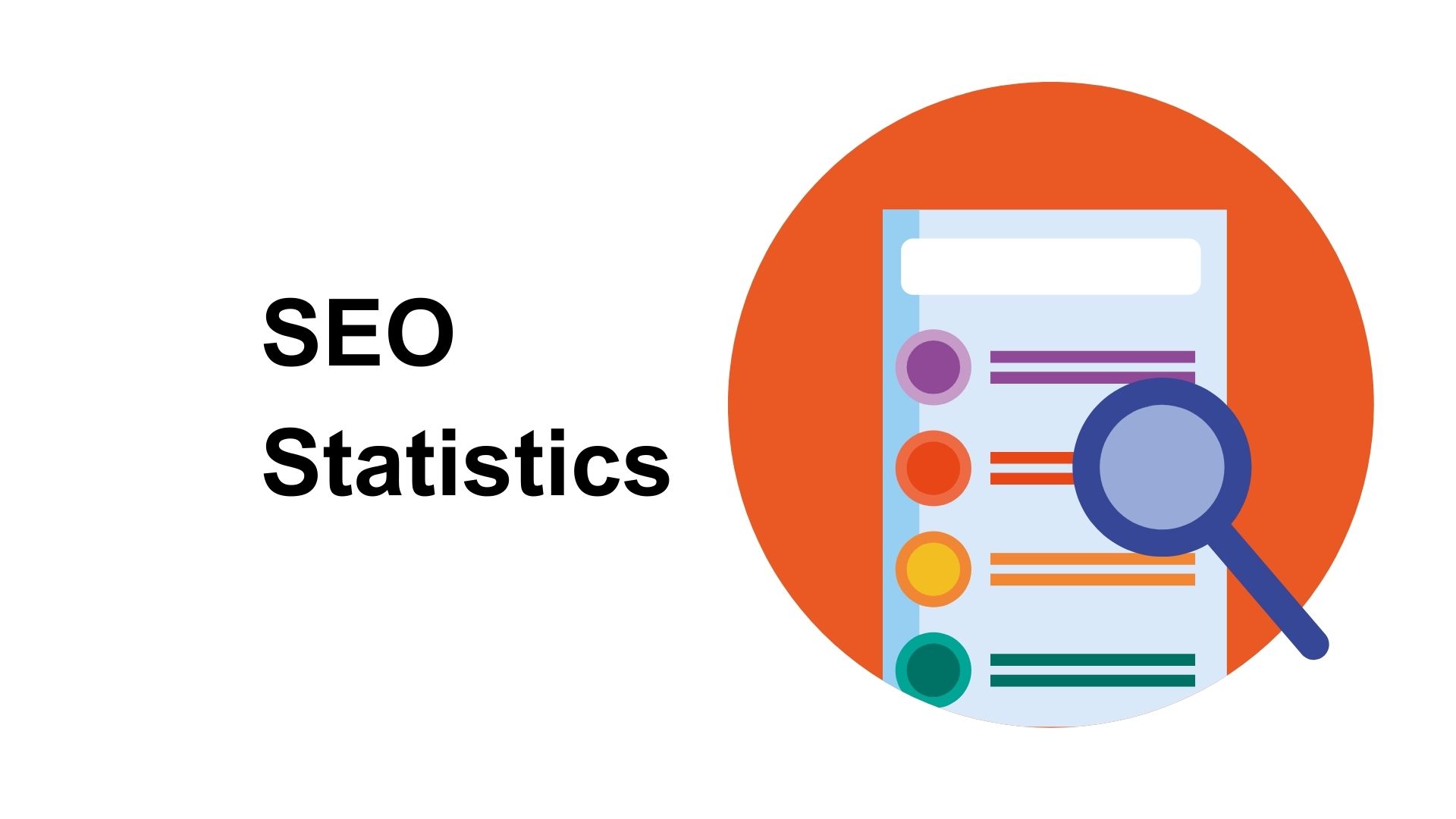Human Resources Software Market Size USD 71.1 Bn by 2032| at a CAGR 10.4%

Page Contents
Market Overview
Published Via 11Press: The Human Resources (HR) Software Market is a rapidly developing industry that provides solutions to automate and streamline HR processes. This demand for efficient HR management tools, real-time data analytics, and cloud-based HR solutions has driven market growth.
Human Resources (HR) Software Market is expected to increase from USD 26.4 billion in 2022 to USD 71.1 billion by 2032, at a compound annual growth rate (CAGR) of 10.4% over the forecast period.
The report highlights the increasing adoption of cloud-based HR solutions as a major factor driving market growth. Cloud-based solutions offer scalability, flexibility, and cost-effectiveness that make them appealing options for organizations of all sizes.
The HR software market is divided into distinct categories based on solution type, deployment model, organization size, and end-use industry. Major types of HR software solutions include recruitment/applicant tracking, payroll & compensation management, benefits administration, employee engagement & performance management as well as learning & development.
Based on the deployment model, the market can be divided into on-premises and cloud-based solutions. On-premises solutions are installed and operated within a company's own servers, necessitating regular upkeep and upgrades; while cloud-based solutions are hosted remotely and accessed over the internet.

Drivers, trends, and challenges have an impact on market dynamics, which can impact businesses. Request for PDF sample report
Key Takeaways
- The global HR software market is forecast to experience a compound annual growth rate (CAGR) of 10.4% between 2021 and 28.
- Cloud-based solutions are becoming more prevalent due to their scalability, adaptability, and cost-efficiency.
- The HR software market is divided into distinct segments based on solution type, deployment model, organization size, and end-use industry. Leading players in this space include SAP SE, Oracle Corporation, Workday Inc., ADP LLC, and Ultimate Software Group Inc.
Regional Snapshot
- North America is the leading regional market for HR software, led by major players and the high adoption of advanced technologies.
- Europe is expected to experience significant growth due to an increasing inclination toward cloud-based HR solutions.
- The Asia Pacific region is expected to experience high growth due to the rapid adoption of digital technologies and an increasing need for effective HR management solutions.
- Latin America and the Middle East/Africa regions are expected to experience growth due to increasing awareness about HR software solutions. Nonetheless, these regions currently have a smaller market share compared to other regions.
Drivers
- Growing demand for efficient HR management tools: The HR software market is being propelled by organizations' desire to automate and streamline their HR processes, leading to increased efficiency and reduced costs.
- Cloud-based HR Solutions Are on the Rise: Cloud-based solutions offer scalability, adaptability, and cost efficiency – making them attractive options for organizations of all sizes.
- Real-Time Data Analytics: HR software solutions are increasingly being utilized to collect and analyze real-time data, enabling organizations to make informed decisions and enhance their HR management strategies.
- Increased Adoption of Mobile-based HR Solutions: As more mobile devices become ubiquitous, there is an increasing need for HR software solutions that can be accessed via mobile devices, enabling employees to manage their HR-related tasks from anywhere.
Restraints
- Security Concerns: With the growing use of digital technologies, cyber threats, and data breaches have become more frequent occurrences, necessitating HR software vendors to prioritize protecting their solutions from such incidents.
- Integration Challenges: Integrating HR software with existing HR systems and processes can be a time-consuming and complex undertaking, which may inhibit the adoption of certain HR software solutions.
- High Initial Investment: Implementing HR software solutions may involve substantial upfront expenses, which may prove prohibitive for some organizations – particularly small and medium-sized ones.
- Lack of Technical Competence: Adopting and administering an HR software solution necessitates technical proficiency, which could pose a challenge for organizations that lack these skills in-house.
Opportunities
- Expansion of the HR software market: Although still young, this sector offers significant potential for growth as more organizations adopt HR software solutions.
- Emerging Markets: Emerging regions such as the Asia Pacific region provide significant growth prospects for HR software vendors due to the increasing adoption of digital technologies and an increasing need for effective HR management solutions.
- Integration with Other Systems: Integrating HR software with other enterprise applications, such as enterprise resource planning (ERP) or customer relationship management (CRM), presents HR software vendors with additional opportunities to expand their offerings.
- Innovation: Ongoing advances in HR software solutions, such as artificial intelligence (AI) and machine learning (ML), offer vendors of HR software a chance to stand out from their rivals.
Challenges
- Data Privacy Issues: As HR software solutions collect and store sensitive employee data, data privacy concerns present a major challenge for vendors of HR software solutions.
- Competition: The HR software market is highly competitive, with both established players and newcomers jostling for market share.
- Limited adoption by small and medium-sized enterprises (SMEs): Small and medium-sized enterprises (SMEs) may find it difficult to adopt HR software solutions due to the high initial investment and technical expertise necessary for implementation and management. As a result, the adoption of such systems within this segment remains limited.
- Changed Regulations: Shifting regulations such as labor laws and data privacy rules can present a challenge for HR software vendors who must ensure their solutions adhere to these rules.
Recent Developments
- On February, 2021, SAP unveiled its Human Experience Management (HXM) suite, designed to offer a more tailored and holistic approach to HR management.
- In October 2020, Workday Inc. announced the acquisition of Peakon, a real-time employee feedback platform, to expand its human capital management (HCM) offering.
- Cezanne HR, a UK-based HR software provider, announced the launch of its new mobile app to give employees convenient access to HR tasks and data.
- In July 2020, ADP, LLC released its ADP Workforce Vitality Report which offers insights into the state of America's workforce.
Key Market Segments
Type
- On-Premises HR Software
- Cloud-Based HR Software
- Web-based HR Software
Application
- Small and Medium Business
- Large Business
Key Market Players
- ADP
- Kronos Workforce Ready
- SAP
- Cornerstone OnDemand
- Workday
- Gusto
- BambooHR
- ClearCompany HRM
- Zenefits
- APS (Automatic Payroll Systems#Inc.)
- iCIMS
- Namely
- Paychex Flex
- TribeHR
- Ascentis
- PayFocus
- TimeAttend
- Jobvite
- Greenhouse
- Performance Pro
Report Scope
| Report Attribute | Details |
| The market size value in 2022 | USD 26.4 Bn |
| Revenue forecast by 2032 | USD 71.1 Bn |
| Growth Rate | CAGR Of 10.4% |
| Regions Covered | North America, Europe, Asia Pacific, Latin America, and Middle East & Africa, and Rest of the World |
| Historical Years | 2017-2022 |
| Base Year | 2022 |
| Estimated Year | 2023 |
| Short-Term Projection Year | 2028 |
| Long-Term Projected Year | 2032 |
Frequently Asked Questions
Q: What is HR software?
A: HR software is a type of software designed to help organizations manage and automate their HR-related tasks, such as employee management, payroll, benefits administration, and performance management.
Q: What are the benefits of using HR software?
A: HR software can help organizations streamline their HR processes, reduce costs, increase efficiency, and improve decision-making by providing real-time data and analytics.
Q: What are the different types of HR software?
A: HR software can be categorized based on the solution type, deployment model, organization size, and end-use industry. Common types of HR software include human capital management (HCM) software, payroll software, talent management software, and workforce management software.
Q: What are the challenges of implementing HR software?
A: Implementing HR software can involve significant upfront costs, integration challenges, data privacy concerns, and the need for technical expertise.
Q: What is the future of the HR software market?
A: The HR software market is expected to continue to grow due to the increasing demand for efficient HR management solutions, the growing trend of cloud-based solutions, and the emergence of new technologies such as AI and ML.
The team behind market.us, marketresearch.biz, market.biz and more. Our purpose is to keep our customers ahead of the game with regard to the markets. They may fluctuate up or down, but we will help you to stay ahead of the curve in these market fluctuations. Our consistent growth and ability to deliver in-depth analyses and market insight has engaged genuine market players. They have faith in us to offer the data and information they require to make balanced and decisive marketing decisions.



